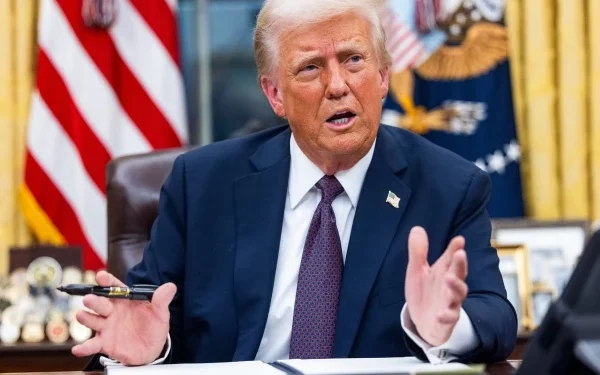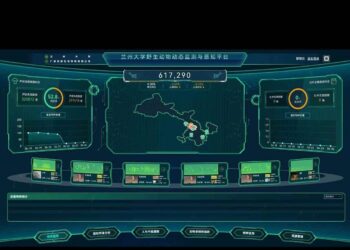New Jersey — In a statement that has sparked international debate and domestic controversy, U.S. President Donald J. Trump publicly rejected the findings of his own intelligence community regarding Iran’s nuclear program. The remarks were made to reporters after his arrival in New Jersey aboard Air Force One, and they mark yet another episode of growing divergence between the White House and the U.S. national security establishment.
A Stark Rebuttal of Intelligence Findings
When asked whether he agreed with Director of National Intelligence (DNI) Tulsi Gabbard, who recently asserted that there was no concrete evidence that Iran is currently developing nuclear weapons, President Trump responded bluntly:
“My intelligence community is wrong.”
This direct rejection of a formal intelligence assessment from one of the most powerful positions in the world has drawn sharp attention. It raises concerns not only about the credibility of U.S. foreign policy but also about the internal coherence of decision-making within the Trump administration.
This isn’t the first time President Trump has publicly contradicted U.S. intelligence agencies. During his first term in office, he notably rejected findings related to Russian interference in the 2016 U.S. election, siding instead with Russian President Vladimir Putin at a summit in Helsinki. His most recent dismissal of intelligence on Iran’s nuclear program is being viewed through a similarly controversial lens.
Contradictions Between Intelligence and Policy
The U.S. intelligence community, under the Office of the Director of National Intelligence (ODNI), has maintained that there is no credible evidence that Iran is actively building nuclear weapons. While acknowledging Iran’s previous efforts and its nuclear ambitions before the 2015 Joint Comprehensive Plan of Action (JCPOA), U.S. analysts have consistently reported that Tehran has not resumed its weapons program since the U.S. withdrawal from the deal in 2018.
Yet President Trump, citing what he described as “classified sources” and unnamed advisors, insisted that Iran may still be engaged in covert nuclear activity.
“Iran cannot be trusted. We’ve seen what they’ve done before. Just because some analysts say something doesn’t mean I believe it,” he added.
This public contradiction underscores a growing rift between Trump’s foreign policy rhetoric and intelligence-based decision-making, leaving allies, analysts, and observers confused about the actual U.S. position on Iran.
Israel-Iran Conflict: A Delicate Ceasefire Dilemma
President Trump also addressed the ongoing military conflict between Israel and Iran, stating that while he might support a ceasefire, the conditions are “not right at this time.” According to him, Israel holds the strategic advantage in the conflict, and this complicates the ability to request restraint from a party perceived as “winning.”
“It’s very difficult to demand that Israel stop bombing Iran when they’re the ones winning. That kind of demand is much easier when you’re on the losing side,” he told reporters.
This statement has drawn criticism from several international human rights groups, who argue that civilian casualties in Iran demand urgent diplomatic action, regardless of which side holds the advantage militarily.
U.S.-Iran Talks: A Possibility Amid Contradiction
Despite the hostile rhetoric and military tensions, President Trump stated that the United States remains open to negotiations with Iran.
“We’re ready to talk. We’re also in contact with Iran. Let’s see what happens,” he said, while adding that Iran has been given a two-week deadline to respond to unspecified diplomatic overtures.
Observers believe this timeline is tied to an unofficial American proposal to initiate a framework for de-escalation, although details remain scarce. According to diplomatic sources, U.S. Special Envoy Steve Witkoff has engaged in back-channel discussions with Iranian Foreign Minister Abbas Araqchi in recent weeks.
However, Iran has firmly rejected any direct dialogue until Israel halts its airstrikes.
A senior Iranian official said:
“There will be no talks with the U.S. as long as Israel continues its aggression against our people and territory.”
This conditional stance has effectively stalled any hope of near-term diplomatic progress, raising concerns that further escalation could occur before a new framework is agreed upon.
Trump’s Criticism of Europe’s Role in the Crisis
In another controversial comment, President Trump expressed skepticism about Europe’s ability to contribute meaningfully to resolving the Israel-Iran conflict.
“Europe won’t be able to help in this conflict,” Trump remarked, implying that the European Union’s diplomacy lacks the necessary influence or unity to manage the crisis.
This sentiment reflects growing American frustration with European indecision, particularly in light of previous disputes over NATO funding, Iran sanctions, and divergent approaches to Middle East policy.
European leaders, including French President Emmanuel Macron and German Chancellor Olaf Scholz, have urged de-escalation and called for an emergency diplomatic summit in Geneva. However, the U.S. has yet to commit to participation in that summit, further complicating multilateral efforts.
Geopolitical Consequences of Trump’s Remarks
President Trump’s latest statements could have far-reaching geopolitical implications:
- They may undermine the credibility of the U.S. intelligence apparatus internationally.
- They could signal a shift in U.S. Middle East strategy, placing more trust in military dominance rather than diplomacy.
- His refusal to condemn Israeli strikes outright may embolden further aggressive action, increasing the risk of a full-scale regional war.
Meanwhile, countries such as Russia, China, and Turkey are closely watching the unfolding situation and may leverage the instability to assert greater influence in the Middle East.
Reactions from Capitol Hill and the Intelligence Community
On Capitol Hill, the response has been mixed. Republican allies of President Trump have supported his right to question intelligence assessments, citing historical inaccuracies in past intelligence reports.
Senator Josh Hawley (R-MO) remarked,
“The President is right to challenge the status quo. Blindly trusting intelligence has led us into wars before.”
In contrast, Democratic lawmakers have accused Trump of politicizing intelligence to suit his foreign policy narrative.
Senator Chris Murphy (D-CT) said:
“Undermining our own experts weakens America’s position abroad and risks disaster.”
Within the intelligence community, morale is reportedly low, as public trust in their assessments appears to be waning under Trump’s leadership. An anonymous senior official in the ODNI stated:
“Our analysis is based on facts, not politics. If it’s ignored, then why are we doing this?”
Conclusion: A Pivotal Moment in U.S. Foreign Policy
President Trump’s public dismissal of intelligence findings on Iran’s nuclear program, coupled with his ambivalent stance on the Israel-Iran conflict, presents a complex and volatile moment in U.S. foreign policy. As tensions escalate in the Middle East, the world watches closely to see whether Trump’s “gut-driven diplomacy” will yield results or plunge the region into further instability.
With only two weeks on the clock, the international community is bracing for either a breakthrough — or a breakdown — in peace efforts.

























